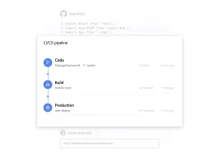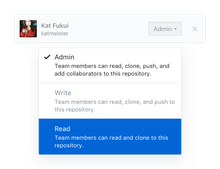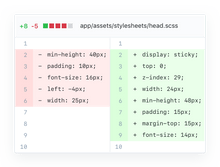How are Azure DevOps and GitHub Different?
GitHub is renowned for its user-friendly interface and extensive community collaboration features. With a focus on version control using Git, GitHub provides a platform for developers to host, review, and manage code repositories efficiently. Its integration with various third-party tools and services makes it a preferred choice for both individuals and enterprises alike.
Azure DevOps was previously known as Team Foundation Server and Visual Studio Team System. It is a comprehensive suite of development tools provided by Microsoft that encompasses various services such as version control, agile planning, continuous integration, and deployment. It offers an integrated environment for managing the entire development lifecycle, from planning and coding to testing and release.
Comparison Table: Azure DevOps vs GitHub
| Comparison of Azure DevOps and GitHub |
| Feature |
Azure DevOps |
GitHub |
| Project Management |
Advanced (Boards, Backlogs, Sprints) |
Lightweight (Issues, Projects) |
| CI/CD |
Built-in Pipelines |
GitHub Actions (modern workflows) |
| Repository Hosting |
Git-based (private by default) |
Git-based (public & private) |
| Collaboration Tools |
Basic code review & comments |
PRs, issues, discussions |
| Open Source Integration |
Limited |
Deeply integrated |
| Marketplace Extensions |
Azure DevOps Marketplace |
GitHub Marketplace |
| Permissions Management |
Granular role-based control |
Simpler but effective |
| Enterprise Integration |
Strong with Microsoft stack |
Improving, but less mature |
| Support |
Microsoft enterprise support |
Community + GitHub Support Plans |
| Pricing |
Price on Request |
Free tier + $4 per user/month |
Detailed Feature Comparison of Azure DevOps vs GitHub
Both GitHub and Azure DevOps differ from each other when it comes to project management, version control, artifacts management, code repository, integrations, and more. Here is a comparison of GitHub vs Azure DevOps in terms of features:
- Project Management & Processes: For organized, Agile development environments, Azure DevOps offers enterprise-grade tools such as Boards, epics, stories, and sprints. In contrast, GitHub Projects is better suited for startups or smaller teams because it is more adaptable project management software, but lacks the depth of Azure Boards.
- Version Control: GitHub is known for its version control and tracing capabilities. It offers core version control functionalities like Git branching, merging, and conflict resolution. As developers make changes to the project, it lets you recover any earlier version of a project at any time. On the surface, Azure DevOps supports both Team Foundation Version Control (TFVC) and Git to track changes, but its traceability features can’t match GitHub.
- Automation and Deployment of CI/CD: Azure DevOps Pipelines have robust connections with Azure Cloud and support both YAML and traditional editors. GitHub Actions are more up-to-date, simpler for small teams to utilize, and integrate right into your repository—perfect for teams that work quickly or are open-source.
- Artifact Management: An artifact is a file or collection of files that is created during the software development process. It can be documents, codes, services, or components. GitHub does not have a native artifact management system. So, it must be integrated with external artifact repositories such as Nexus3 or Spinnaker to manage the artifacts. On the contrary, Azure DevOps has a built-in artifact management feature that provides a central repository to store and manage artifacts.
- Code Repositories: Git-based repositories are supported by both systems, although GitHub is better at social coding. GitHub's strengths include forking, pull requests, and community-driven collaboration. Azure Repos, on the other hand, are more suited to private company development with more detailed regulations.
- Access Control and Permissions: Large teams with intricate structures can benefit from Azure DevOps' comprehensive, role-based access control at every project level. Although team and repository-level permissions offered by GitHub are functional, they could not offer the corporate control that certain businesses need.
- Enterprise Ecosystem and Cloud: Active Directory, other enterprise technologies, and the Microsoft Azure ecosystem are all closely linked with Azure DevOps. With GitHub Enterprise Cloud and Codespaces, GitHub is making progress in this area, while it still favors open-source and cloud-native teams.
- Ease of Use & Developer Experience: Developers can do anything to use GitHub's slick and user-friendly interface. There is not much of a learning curve. Despite its strength, Azure DevOps might be intimidating and has a more "corporate" UI. It is designed for structure rather than ease of use.
GitHub vs Azure DevOps: Integrations & Marketplace
GitHub supports a wide range of pre-built integrations with popular productivity, communication, and testing tools. It can integrate with tools like Trello, Zapier, Slack, etc. Furthermore, it also supports an open API to integrate with a vast ecosystem of third-party tools and services.
Azure DevOps supports seamless integration with other Microsoft products and Azure services. Additionally, it has pre-built connectors, and it also offers a good selection of pre-built connectors for common DevOps tools within the Microsoft stack. Overall, Azure DevOps has an upper hand over GitHub in terms of integration.
GitHub or Azure DevOps: Scalability & Performance
GitHub is highly scalable due to its cloud-based infrastructure. It can handle massive codebases and large user bases with minimal performance impact. Moreover, it is known for its fast and responsive user interface. It offers features like version control operations, branching, merging, and pushing code that are typically smooth even for large repositories.
On the surface, Azure DevOps also offers excellent scalability with Microsoft's robust cloud infrastructure. It provides options for geographically distributed deployments that ensure improved performance in specific regions. However, performance can vary depending on the specific Azure DevOps services used and the complexity of your workflows.
GitHub and Azure DevOps: Pricing
GitHub has a generous free plan for individuals and open-source projects. Azure DevOps requires a paid user license for most advanced features. However, for enterprise deployments, Azure DevOps may offer better value when bundled with Microsoft services.
GitHub offers both free and paid plans. Its free plan offers 2000 CI/CD minutes per month along with 500 MB of package storage. The paid plan of GitHub starts at $4/month per user. On the other hand, Azure DevOps also follows a similar pricing structure, with free and paid plans. DevOps’s free plan is better compared to GitHub as it offers 1800 CI/CD minutes per month with 2 GiB of file storage. The Azure DevOps pricing is on request.
Which is Better—Azure DevOps or GitHub?
Your choice depends on your team’s structure, scale, and priorities. If you require structured project management, extensive Azure integration, and comprehensive ALM tools, go with Azure DevOps. If you're interested in open-source development, code collaboration, or a streamlined DevOps workflow, go with GitHub. GitHub is quick, cutting-edge, and adaptable for new businesses and independent developers. Despite being a little more complicated, Azure DevOps provides management, compliance, and scalability for businesses.
Need Help Choosing the Right DevOps Tool?
Contact our Techjockey Team today for tailored recommendations and product demos.


 4 Ratings & 0 Reviews
4 Ratings & 0 Reviews





















